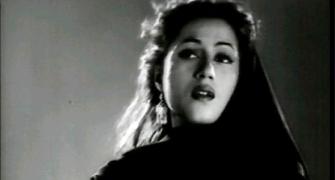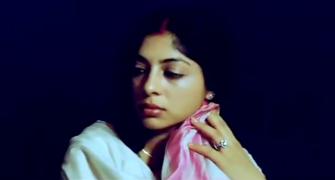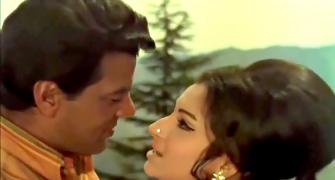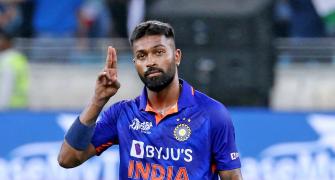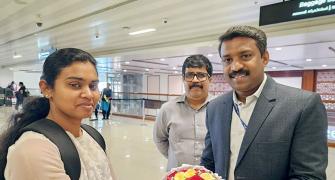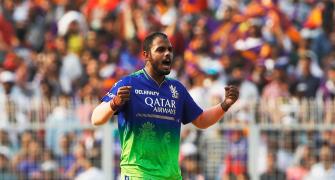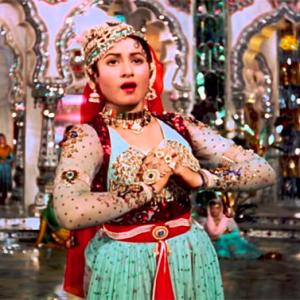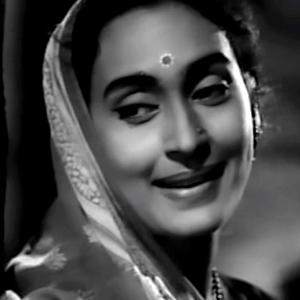Lata Mangeshkar sang many, many songs.
But three of them were truly career-defining.
Subhash K Jha lists them on Lataji's 94th birth anniversary on September 28, 2023.
Dil Mera Toda from Majboor (1948)

It was because of this hit song that Lataji's journey as the singing supremo started.
During an interview 30 years ago with me, Lataji had credited Majboor Composer Master Ghulam Haider with her career kick-start.
"There are many versions and stories of who discovered me and who was instrumental in giving me my first big break. Let me tell you the true story. When I came to Mumbai, I worked for Master Vinayak. My sister Meena and I stayed with his father while the rest of my family lived in my mother's parents' home," Lataji had said.
"In 1946, I told Master Vinayak that I needed to live with my family. That's when we started living in one home. In 1947, Master Vinayak passed away. Ten days after his death, a photographer who worked in his company took me to a music director named Harishchandra Vade. He heard me sing and recorded two songs in my voice for a film called Love Is Blind. That film got shelved.
"A junior artiste supplier, a Pathan, heard me sing. He recommended me to Master Ghulam Haider, who had just come from Pakistan. I respected him for his music in Khazanchi, Shahid, Khandaan etc.
"I went to meet him with my cousin. This was 1947 and I was merely 18. I remember he was recording. He kept me waiting till evening. He finally called me to sing around 5 pm. When I went in, he was playing the piano. I got frightened. I wondered what a music composer who had worked with Noorjehan would think of me.
"He asked me to sing and I sang one of his songs from the film Humayun. He asked me to sing another song, and I sang a Noorjehan number. Then he wanted to record my voice. During those days, songs were recorded on film. There was no tape. He asked me who my guru was. When I told him it was Amanat Ali Khansaab, he said they were friends.
"Then Master Ghulam Haider played my voice to the successful producer Shashdhar Mukherji, who said, 'Yeh awaaz nahin chalegi, yeh awaaz bahot patli hai.' Shashdharji needed a playback voice for Kamini Kaushal and he felt my voice didn't match hers.
"Master Ghulam Haider was livid. He ordered me to accompany him to the Bombay Talkies studio where Majboor was being shot. He was the music composer. He didn't say anything to me. He just made me rehearse a song.
"Later when we recorded he said, 'People will forget everyone, including Noorjehan, when they hear you.'
The first song he recorded with me was a duet with Mukesh bhaiyya, Angrezi Chora Chala Gaya. This was my first major break. I recorded three-four songs for Majboor.
"Composer Khemchand Prakash heard them and signed me for Ziddi. For this film, I sang a duet with Kishore Kumar. Then Composer Anil Biswas heard me. That's how my musical journey began.
"The credit for giving me my first major break goes to Master Ghulam Haider. Incidentally, Shashdhar Mukherji later admitted that he was wrong about my voice and crazy to have rejected it. I sang for many of his films, including Anarkali and Nagin."
Ae Diluba from Rustam Sohrab (1963)

This masterpiece ranks very high on Lataji's list of challenging songs.
"It has an Arabesque lilt, very unusual for those times in Hindi film songs. And it followed no conventional format. Sajjad Hussainsaab who composed this, one of the most important songs of my career, was one of the earliest composing stalwarts to show faith in my voice.
"He was the second man, after my father, who predicted my future as a singer. I didn't get to sing too many songs for him, but Ae Dilruba remains a favourite.
"Sajjad Hussain composed complex songs. There were rumours that he was too exacting, temperamental and egotistic. I loved Sajjad Hussain's music because, like Naushadsaab and Madan bhaiyya (the composer Madan Mohan) he insisted on poetic lyrics. These composers understood and appreciated Urdu.
"Those who had some difficulties with Urdu or Hindi would consult specialists. For instance, Burmandada (the composer Sachin Dev Burman) and Salil Chowdhary would make a thousand inquiries about Urdu and Hindi words.
"I'll tell you another thing about Sajjadsaab's music. He was very particular about melody. Even if one instrument was slightly off-key, he would be livid. Once during a recording, he asked a famous singer to stop at the gandhar. The singer wanted to know what gandhar was. Sajjadsaab was aghast.
"Sometimes I wonder what he would have said about today's singers. Like my brother, Sajjadsaab used to get angry with any trace of imperfection. He would compose nothing but classical music. He played the mandolin superbly."
Oh Sajna Barkha Bahaar Aye from Parakh (1960)

Lataji admits that of all the challenging compositions that she sang for Salil Chowdhary, O Sajna Barkha Bahaar ranks as the most influential.
"I've sung many songs about the rain but none as beloved as O Sajna. The sitar is the real star of this song, not me," she had said.
The sitar in the song was played by Jayram Acharya who passed away in 2017.


